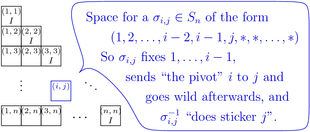10-1100/Homework Assignment 2: Difference between revisions
From Drorbn
Jump to navigationJump to search
No edit summary |
No edit summary |
||
| (2 intermediate revisions by the same user not shown) | |||
| Line 1: | Line 1: | ||
{{10-1100/Navigation}} |
{{10-1100/Navigation}} |
||
{{In Preparation}} |
|||
This assignment is due at class time on Thursday, October 21, 2010. |
This assignment is due at class time on Thursday, October 21, 2010. |
||
===Solve the following questions=== |
===Solve the following questions=== |
||
# (Selick) |
|||
## What it the least integer <math>n</math> for which the symmetric group <math>S_n</math> contains an element of order 18? |
|||
## What is the maximal order of an element in <math>S_{26}</math>? (That is, of a shuffling of the red cards within a deck of cards?) |
|||
# (Selick) Let <math>H</math> be a subgroup of index 2 in a group <math>G</math>. Show that <math>H</math> is normal in <math>G</math>. |
|||
# Let <math>\sigma\in S_{20}</math> be a permutation whose cycle decomposition consists of one 5-cycle, two 3-cycles, and one 2-cycle. What is the order of the centralizer <math>C_{S_{20}}(\sigma)</math> of <math>\sigma</math>? |
|||
# (Selick) Let <math>G</math> be a group of odd order. Show that <math>x</math> is not conjugate to <math>x^{-1}</math> unless <math>x=e</math>. |
|||
# (Dummit and Foote) Show that if <math>G/Z(G)</math> is cyclic then <math>G</math> is Abelian. |
|||
# (Lang) Prove that if the group of automorphisms of a group <math>G</math> is cyclic, then <math>G</math> is Abelian. |
|||
# (Lang) |
|||
## Let <math>G</math> be a group and let <math>H</math> be a subgroup of finite index. Prove that there is a normal subgroup <math>N</math> of <math>G</math>, contained in <math>H</math>, so that <math>(G:N)</math> is also finite. (Hint: Let <math>(G:H)=n</math> and find a morphism <math>G\to S_n</math> whose kernel is contained in <math>H</math>.) |
|||
## Let <math>G</math> be a group and <math>H_1</math> and <math>H_2</math> be subgroups of <math>G</math>. Suppose <math>(G:H_1)<\infty</math> and <math>(G:H_2)<\infty</math>. Show that <math>(G:H_1\cap H_2)<\infty</math> |
|||
Latest revision as of 12:29, 20 October 2010
| |||||||||||||||||||||||||||||||||||||||||||||||||||||||||
This assignment is due at class time on Thursday, October 21, 2010.
Solve the following questions
- (Selick)
- What it the least integer [math]\displaystyle{ n }[/math] for which the symmetric group [math]\displaystyle{ S_n }[/math] contains an element of order 18?
- What is the maximal order of an element in [math]\displaystyle{ S_{26} }[/math]? (That is, of a shuffling of the red cards within a deck of cards?)
- (Selick) Let [math]\displaystyle{ H }[/math] be a subgroup of index 2 in a group [math]\displaystyle{ G }[/math]. Show that [math]\displaystyle{ H }[/math] is normal in [math]\displaystyle{ G }[/math].
- Let [math]\displaystyle{ \sigma\in S_{20} }[/math] be a permutation whose cycle decomposition consists of one 5-cycle, two 3-cycles, and one 2-cycle. What is the order of the centralizer [math]\displaystyle{ C_{S_{20}}(\sigma) }[/math] of [math]\displaystyle{ \sigma }[/math]?
- (Selick) Let [math]\displaystyle{ G }[/math] be a group of odd order. Show that [math]\displaystyle{ x }[/math] is not conjugate to [math]\displaystyle{ x^{-1} }[/math] unless [math]\displaystyle{ x=e }[/math].
- (Dummit and Foote) Show that if [math]\displaystyle{ G/Z(G) }[/math] is cyclic then [math]\displaystyle{ G }[/math] is Abelian.
- (Lang) Prove that if the group of automorphisms of a group [math]\displaystyle{ G }[/math] is cyclic, then [math]\displaystyle{ G }[/math] is Abelian.
- (Lang)
- Let [math]\displaystyle{ G }[/math] be a group and let [math]\displaystyle{ H }[/math] be a subgroup of finite index. Prove that there is a normal subgroup [math]\displaystyle{ N }[/math] of [math]\displaystyle{ G }[/math], contained in [math]\displaystyle{ H }[/math], so that [math]\displaystyle{ (G:N) }[/math] is also finite. (Hint: Let [math]\displaystyle{ (G:H)=n }[/math] and find a morphism [math]\displaystyle{ G\to S_n }[/math] whose kernel is contained in [math]\displaystyle{ H }[/math].)
- Let [math]\displaystyle{ G }[/math] be a group and [math]\displaystyle{ H_1 }[/math] and [math]\displaystyle{ H_2 }[/math] be subgroups of [math]\displaystyle{ G }[/math]. Suppose [math]\displaystyle{ (G:H_1)\lt \infty }[/math] and [math]\displaystyle{ (G:H_2)\lt \infty }[/math]. Show that [math]\displaystyle{ (G:H_1\cap H_2)\lt \infty }[/math]

